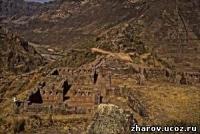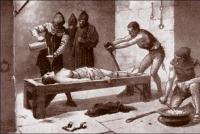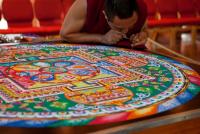Martin luther short biography. Martin Luther - biography, photo, personal life of the reformer Martin Luther brief information
Founder of the Evangelical Lutheran Church. Born in Eisleben (in Saxony) on November 10, 1483. He came from a peasant class, was the son of a miner and received a strict religious and moral education in the family. In 1501, he entered the University of Erfurt, where, studying law (at the request of his father), at that time he was engaged in philosophical sciences, and also learned all the necessary methods of dialectics. At the same time, Martin Luther studied the Latin classics and entered into close relations with the representatives of Erfurt humanism - Rubianus and Lang. In 1502, Luther received a bachelor's degree, and in 1505 a master's degree in philosophy.
In the same year insignificant; the event served as an impetus for a change in Luther's life, which laid the foundation for his future activities. The storm that overtook him in the mountains made a deep impression on his ardent nature; Luther was, in his own words, "seized with fear sent down from heaven," and from that time began to be tormented by doubts about the possibility of achieving salvation in the sinfulness of human nature. He left a scattered life, entered the Augustinian monastery in Erfurt and received a priestly rank (1507). However, despite a life full of work and repentance, the fear of divine punishment did not leave Luther, and in the quiet of his cell he experienced more than one difficult moment of sadness and despair. A decisive revolution in his spiritual world was made by one old monk, who resolved all his doubts by simply pointing to the chapter on the remission of sins. A zealous study of the Holy Scriptures, on the one hand, and conversations with the Prior of the Augustinian Order, Staupitz, on the other hand, contributed to the strengthening in Martin Luther of the consciousness of the possibility of achieving eternal salvation by the power of faith alone.
Portrait of Martin Luther. Artist Luke Cranach the Elder, 1525
Having made a trip to Rome on behalf of his order in 1511, Luther was horrified to see the deep depravity of the Catholic clergy. Nevertheless, he returned from Rome still a faithful son of the Catholic Church, deeply believing in its boundless authority. Even before his trip to Rome, Martin Luther had begun lecturing at the newly founded University of Wittenberg on Aristotle; having become a doctor of theology (1512), he began to read on the epistles of the Apostle Paul, while at the same time delivering frequent sermons in the Wittenberg churches on the topic of God's grace, achieved through faith, which became the cornerstone of his teaching.
Luther's 95 Theses (briefly)
Soon Luther had an opportunity to openly act as an enemy of the Roman church. The abuse of papal indulgences then reached its extreme limits. The monk Tetzel, who sold these indulgences, also appeared in the vicinity of Wittenberg (1517), precisely at the time when the anniversary of the consecration of the local palace church was celebrated there. According to the custom of that time, such festivities were accompanied by publications nailed to the doors of the temple; Luther took advantage of this and nailed 95 theses to the church doors, in which he pointed out the difference between repentance, as an act of inner, moral peace, and the existing church system of repentance. The success of the 95 theses was extraordinary: within 14 days they managed to go around the whole of Germany and were met with universal sympathy. At the beginning of 1518, 95 theses were condemned by the papal censor; and in 1519 the papal theologian Eck challenged Martin Luther to a public debate at Leipzig (concerning chiefly the question of the supremacy of the pope), after which there was a final break between Luther and the Roman Church.
Luther's burning of the papal bull
Working tirelessly with a pen, Martin Luther began to develop in his writings the doctrine of the right to the priesthood of all believers, of religious freedom, that the church does not need an earthly substitute in the person of the pope, and demanded, among other things, communion under both types and for the laity. . These teachings, and his association with such notorious enemies of Rome as Hutten, finally brought the wrath of the pope upon Luther. In 1520, a papal bull appeared that renounced him from the church, to which Luther responded with a new essay: “On the Freedom of the Christian Person,” and he solemnly burned the bull along with papal decretals in front of the gates of Wittenberg. Luther was saved from punishment for this act only by the intercession of Elector Frederick the Wise, who was viceroy of the imperial throne before the election of Charles V.

Both in the aforementioned and in other works published in the same year (“To the Christian nobility of the German nation on the correction of the Christian state” and “On the Babylonian captivity of the church”), Martin Luther calls on Christianity to fight against the arrogant demands of the pope and the clergy, demands the destruction of the enslaving people of the system of remission of sins and points to a direct approach to God through faith, as the only source of peace and bliss.
Luther at the Diet of Worms 1521 and at Wartburg Castle
In 1521 Martin Luther was called to account before Emperor Charles V and the Reichstag; Appearing at the Imperial Diet at Worms, he boldly defended his teaching in the face of the authorities and numerous people and decisively rejected the proposal to renounce his ideas.

Luther at the Diet of Worms. Painting by A. von Werner, 1877
On the way back, on the initiative of his patron, the Saxon elector Frederick the Wise, Luther was "attacked" by disguised "robbers" who brought him to the Wartburg, where, hiding under a false name, he found a safe haven from all persecution and could calmly surrender to his literary and reform activities. Here Luther made one of the most important works of his life - the translation of the Bible into German.

Luther in the Wartburg (where he lived under the name Jörg). Artist Luke Cranach the Elder, 1521-1522
The Reformation of Martin Luther (briefly)
Not long, however, he stayed in the Wartburg. The fanatical excesses of his followers, the iconoclasm, the indecisiveness of Melanchthon in view of these events called Luther out of his refuge. He reappeared in Wittenberg and, by the power of an ardent sermon, restored calm, after which he devoted himself zealously to the organization of the transformed church, embracing with his reforming activity the divine service (which began to be performed in German, and many of the rites of which were replaced by prayer and the singing of hymns), church organization, school work etc., which resulted in his writings: “On the order of worship in the community”, “Book of Church Songs”, “Large Catechism”, “Small Catechism”, etc. Denying the celibacy of the clergy, Martin Luther married (1525) Katharina von Bora (also a former nun), then began to destroy the monasteries, turning their property into schools, hospitals, etc.

Portrait of Martin Luther and his wife Katharina Bora. Artist Luke Cranach the Elder, 1525
A bold religious reformer, Luther, however, firmly stood for the existing political system, strongly condemning any attempt to change it. Thus, he was an ardent opponent of the Müntzer party, and during Peasants' War in 1525, he ardently condemned the actions of the peasants and Anabaptists in two essays: “A Call for Peace” and “Against the Peasants – Robbers and Murderers”. In the same way, Zwingli's reforming activity met with an adversary in him. In addition to religious and ritual disagreements with the Swiss reformers, Martin Luther was an extreme opponent of the idea of armed resistance, as a result of which he completely rejected the extensive plan of Zwingli and the Landgrave of Hesse regarding the joint action of all reform forces to fight the papacy and the Catholic monarchy. The final break between the Lutheran or Saxon and the South German and Swiss Reformations followed at a religious dispute in Marburg (1529), so that at the Augsburg Reichstag in 1530, the Saxon Germans came out with their own confession of faith (“Augsburg confession”), which completed the process of formation of the Lutheran churches. However, in the following years, Luther continued to tirelessly work on the work he had begun, remaining true to his ideas to the end: in this spirit, he compiled the Schmalkalden articles in 1537; guided by the same ideas, he rejected mediation proposals in Regensburg in 1541 and an invitation to the Council of Trent in 1545.
Luther's personality
Ardent, impulsive, sometimes immoderately harsh when it came to his religious convictions, in private life, Martin Luther was distinguished by clarity of spirit, good-natured humor, a cheerful disposition and a warm, compassionate attitude towards people. His inner, spiritual life represented, however, less tranquility: more than once he experienced difficult, gloomy moments, struggling with the devil, tormented by phantoms that threatened to cloud his consciousness. This was joined by frequent bodily suffering, which developed into a painful illness that brought him to the grave. Until his death, Luther continued to work in Wittenberg as a preacher. He died on February 18, 1546 in Eisleben, in the very city where he was born and where he went a few days before his death. His body is buried in Wittenberg.
Luther Meaning
Martin Luther remembers the reproach of indulging his high-ranking friends, the princes. But this weakness is partly redeemed by his spiritual and moral qualities. Equally important are the services rendered by Luther to German literature. With him begins a new period in the history of the German language; the style of his sermons, pamphlets, treatises is full of energy, strength and expressiveness, and descendants appreciate Martin Luther not only as a church reformer, but also as one of the most popular writers in Germany.
There are several explanations for this unexpected decision. One refers to the oppressed state of Luther as a result of "consciousness of his sinfulness." According to another, one day Luther was caught in a severe thunderstorm and was so frightened that he took a vow of monasticism. The third refers to the excessive severity of parental education, which Luther could not stand. The reason must be sought, apparently, in Luther's entourage and in the fermentation of minds that existed then in the burgher environment. Apparently, Luther's decision was to be influenced by his acquaintance with the members of the humanist circle.
Luther later wrote that his monastic life was very difficult. Nevertheless, he was an exemplary monk and carefully followed all the instructions. Luther entered the Augustinian Order in Erfurt. The year before, John Staupitz, later a friend of Martin, had received the position of vicar of the Order.
Luther made numerous appearances at Jena. It is known that in March 1532 he stayed incognito at the Black Bear Hotel. Two years later he preached in the city church of St. Michael against staunch opponents of the reformation. After the founding of "Salan" in 1537, which later became a university, Luther received ample opportunities here for preaching and calling for the renewal of the church.
Luther's follower Georg Röhrer (1492-1557) edited Luther's works during his visits to the University and the library. As a result, Luther's Jena Bible was published, which is currently in the city's museum.
In 1546 Johann Friedrich I commissioned the master Heinrich Ziegler of Erfurt to make a statue for Luther's tomb in Wittenberg. The wooden statue created by Lucas Cranach the Elder was supposed to be used as the original. The existing bronze plaque ended up in storage at the Weimar castle for two decades. In 1571, the middle son of Johann Friedrich donated it to the university.
The last years of Luther's life were overshadowed by chronic ailments. He died at Eisleben on 18 February 1546.
Luther's Theological Views
Luther's founding principles for attaining salvation: sola fide, sola gratia et sola scriptura (only faith, only grace, and only scripture). Luther declared untenable the Catholic dogma that the church and the clergy are necessary mediators between God and man. The only way to save a soul for a Christian is faith given to him directly by God (Gal. “The righteous shall live by faith”, and also Eph. “For by grace you have been saved through faith, and this is not from you, God's gift”). Luther declared his rejection of the authority of papal decrees and epistles and called for the Bible, rather than the institutional church, to be regarded as the main source of Christian truth. The anthropological component of the teaching Luther formulated as "Christian freedom": the freedom of the soul does not depend on external circumstances, but solely on the will of God.
One of the central and popular provisions of Luther's views is the concept of "calling" (Ger. Berufung). In contrast to the Catholic doctrine of the opposition of the worldly and the spiritual, Luther believed that God's grace is also realized in the professional field in worldly life. God predestines people for this or that kind of activity, investing in them various talents or abilities, and it is the duty of a person to work diligently, fulfilling his calling. In the eyes of God there is no work noble or contemptible.
The labors of monks and priests, no matter how hard and holy they may be, are not one iota different in the eyes of God from the labors of a peasant in the field or a woman working on the farm.
The concept of "calling" appears in Luther in the process of translating a fragment of the Bible into German (Sirah 11:20-21): "keep in your work (calling)"
The main purpose of the theses was to show that priests are not mediators between God and man, they should only guide the flock and be an example of true Christians. “Man saves his soul not through the Church, but through faith,” wrote Luther. He opposed the dogma of the divinity of the person of the pope, which was vividly demonstrated in Luther's discussion with the famous theologian Johann Eck in 1519. Refuting the divinity of the pope, Luther referred to the Greek, that is, Orthodox, church, which is also considered Christian and dispenses with the pope and his unlimited powers. Luther affirmed the inerrancy of Holy Scripture, and questioned the authority of Holy Tradition and councils.
According to Luther, "the dead know nothing" (Eccl. 9:5). Calvin counters this in his first theological work, The Dream of Souls (1534).
The Historical Significance of Luther's Activities
Luther and antisemitism
Postage stamp of the GDR
Luther condemned the Jews as carriers of Judaism for their denial of the Trinity, so he called for their expulsion and destruction of the synagogues, which subsequently aroused the sympathy of Hitler and his supporters. It is no coincidence that the Nazis designated the so-called Kristallnacht as a celebration of Luther's birthday.
Luther and music
Luther knew the history and theory of music well; his favorite composers were Josquin Despres and L. Saenfl. In his writings and letters, he quoted medieval and renaissance treatises on music (the treatises of John Tinktoris almost verbatim).
Luther is the author of the preface (in Latin) to the collection of motets (by various composers) "Pleasant consonances ... for 4 voices" [* 1], released in 1538 by the German publisher Georg Rau. In this text, repeatedly reprinted in the 16th century (including in German translation) and (later) called “Praise to Music” (“Encomion musices”), Luther gives an enthusiastic assessment of imitative-polyphonic music based on cantus firmus [* 2 ] . Whoever is unable to appreciate the divine beauty of such exquisite polyphony, “he is not worthy to be called a man, and let him listen to the donkey screaming and the pig grunting” [* 3] . In addition, Luther wrote a preface (in German) in verse "Frau Musica" to a short poem by Johann Walther (1496-1570) "Lob und Preis der löblichen Kunst Musica" (Wittenberg, 1538), as well as a number of prefaces to songbooks of various publishers, published in 1524, 1528, 1542 and 1545, where he expounded his views on music as an extremely important, integral component of the renewed cult.
As part of the liturgical reform, he introduced the communal singing of strophic songs in German, later called the general Protestant chorale:
I also want us to have as many songs in their native language as possible for people to sing during Mass, immediately after the Gradual and after the Sanctus and Agnus Dei. For it is certain that in the beginning all men sang that which now only the choir [of clergy] sings.
formula missae
Presumably, since 1523, Luther took a direct part in compiling a new everyday repertoire, he himself composed poems (more often he recomposed church Latin and secular prototypes) and selected “decent” melodies for them, both authorial and anonymous, including from the repertoire of the Roman Catholic Church . For example, in the preface to a collection of songs for the burial of the dead (1542), he wrote:
For the sake of a good example, we have selected beautiful melodies and songs used under the papacy for all-night vigils, funeral masses and burials, and printed some of them in this little book, but provided them with other texts to sing the article about the resurrection, and not purgatory with its torment and satisfaction for sins, in which the dead cannot rest and find peace. The chants and notes themselves [of the Catholics] are worth a lot, and it would be a pity if all this was wasted. However, non-Christian and absurd texts or words should go away.
Preface by Martin Luther to the first collection of Protestant chant, the so-called "Wittenberg Songbook" (1524)
The question of how great Luther's personal contribution to the music of the Protestant church has been repeatedly revised over the centuries and remains debatable. Some church songs written by Luther with the active participation of Johann Walther were included in the first collection of four-voice choral arrangements, The Book of Spiritual Chants (Wittenberg, 1524) [* 4] . In the preface to it (see the facsimile quoted) [* 5] Luther wrote:
The fact that the singing of spiritual songs is a good and charitable deed is obvious to every Christian, because not only the example of the prophets and kings of the Old Testament (who glorified God with songs and instrumental music, poems and all kinds of stringed instruments), but also the special custom of psalmody was known to all Christianity from the very beginning. So to begin with, to encourage those who can do it better, I, along with a few others [authors], have compiled some spiritual songs. They are set to four votes
Luther Martin (1483-1546), theologian and politician, head of the Reformation in Germany, founder of German Protestantism (Lutheranism).
Born November 10, 1483 in Eislebahn (Saxony). A graduate of the University of Erfurt and a Master of Liberal Arts, Luther unexpectedly left the path of a secular scientist at a young age and became a monk. He did this, being sure of his extreme sinfulness and fearful of God's wrath. Luther was tonsured in the Augustinian order, known, on the one hand, for the great severity of the charter, and, on the other hand, for theological "liberties", frequent discrepancies with the official church doctrine.
Luther, a man educated and zealous in the faith, quickly stood out among the brethren. Having become a priest, he soon returned to scientific studies - now theological. In 1512, the doctor of theology Luther took the professorial chair of history at the University of Wittenberg. The decline of faith and discipline in the Church, the policy of Pope Giovanni de' Medici (Leo VII), who aspired primarily to power over Italy and personal enrichment, angered Luther. In the end, he became disillusioned with the papal power and placed his hope in the reform of the Church on the secular rulers. In addition, theological studies led him to the conviction of the falsity of the Catholic faith.
Luther rejected the Church's doctrine of grace, the possibility of salvation through good works. According to him, all people are equal before God by virtue of original sin. The acts of the saints were redundant and not needed for salvation, the clergy have no advantages. People are saved only by the power of sincere faith, which itself is a gift from God.
Luther rejected the worship of saints, icons, relics, demanded the severity and "cheapness" of the Church, the subordination of her secular power.
The mass issue of indulgences by Leo VII (letters that forgive sins for money) gave Luther a pretext for open speech. In 1517, he wrote 95 theses in which he accused the mercenary Pope of heresy. Luther ignored the call to Rome, and burned the papal bull, which excommunicated him from the Church, at the same fire with a pile of indulgences (1520) with a large gathering of people.
From that moment on, he became the recognized leader of the Reformation - a movement for the transformation of the Church.
Rejecting papal authority, Luther enlisted the support of the German princes. This was to the advantage of his desire to subordinate the Church to the secular authorities, transferring the appointment of bishops to their will.
The new Pope Clement VII (Giulio Medici), busy with the war for Italy with Emperor Charles W, remained indifferent to German affairs. The burden of the struggle against the Reformation fell on Charles himself - an enemy of the Pope, but a devout Catholic.
In 1530, the German theologian Melanchthon, who joined the Reformation, but was also close to the “people of the Renaissance”, created the Autsburg Confession of Faith together with Luther. The emperor rejected him, which was the beginning of the religious war in Germany.
The scale of the ensuing conflict worried Luther. He reacted sharply to the emergence of new leaders of the Reformation, such as W. Zwingli, T. Müntzer, J. Calvin.
Luther called on the allied princes to punish these "heretics" who led mass uprisings against the existing system. In addition, Pope Paul III, who ascended the throne in 1534 with the assistance of Charles, took up the fight against the Reformation in earnest.
Luther died in his native city on February 18, 1546.
The civil war in Germany raged for nearly a decade.
Compositions
- Lectures on the Epistle to the Romans (1515-1516)
- To the Christian nobility of the German nation ()
- On the freedom of a Christian Von der Freiheit eines Christenmenschen , )
- Against the accursed bull of the Antichrist
Biography
Beginning of life
Martin Luther was born into the family of Hans Luther (1459-1530), a former peasant who moved to Eisleben (Saxony) in the hope of a better life. There, his father changed his profession and took up mining in copper mines. After the birth of Luther, the family moved to the mountain town of Maxfeld, where his father became a wealthy burgher. In 1497, 14-year-old Martin was taken by his parents to the Franciscan school in the city of Marburg. During these times, Luther and his friends earned their bread by singing songs under the windows of devout townsfolk. In 1501, by decision of his parents, Luther entered the University of Erfurt. The fact is that in those days all the burghers sought to give their sons a legal higher education. But he was preceded by the passage of the so-called "liberal arts" course. In 1505, Luther received a master's degree in liberal arts and began to study jurisprudence. Then, against the will of his father, he entered the Augustinian monastery in Erfurt. There are several points of view explaining this unexpected decision. The first is an oppressed state due to the "consciousness of one's sinfulness." The second says that once Luther got into a severe thunderstorm, and was so frightened that he took a vow of monasticism. The third speaks of the extreme severity of parental upbringing, which Luther could not survive. In fact, the reason must be sought in Luther's environment and in the wavering of minds that existed then among the burghers. The decision was also influenced by acquaintance with many members of the circle of humanists. Luther later responded by describing his monastic life as very difficult, but nevertheless he was an exemplary monk and carried out all his assignments with great care. Luther entered the Augustinian order in Erfurt. The year before, the position of vicar of the order was received by the vicar John Staupitz, who later became a friend of Martin. Luther took monastic vows in 1506, and in 1507 he was ordained a priest.
In Wittenberg
In 1508 Luther was sent to teach at the new university at Wittenberg. There he first became acquainted with the works of Blessed Augustine. Luther taught and studied at the same time to earn his doctorate in theology. In 1511 Luther was sent to Rome on business for the order. The trip made an indelible impression on the young theologian. It was there that he first encountered and saw firsthand the depravity of the Roman Catholic clergy. In 1512 he received a doctorate in theology. After that, Luther received the rank of professor of theology instead of Staupitz. Luther was greatly influenced by nominalism and scholasticism. Luther constantly felt himself in a state of suspension and incredible weakness in relation to God, and these experiences played a significant role in shaping his views. In 1509 Luther taught about Peter Lombard, in 1513-15. - about the psalms, 1515-16 - about the epistle to the Romans, in 1516-18. - about the epistles to the Galatians and the Jews. Luther was a painstaking student of the Bible, and in addition to his duties as a teacher, he was the caretaker of 11 monasteries and preached in the church.
Luther said that he was constantly in a state of feeling sin. After a severe crisis, Luther discovered for himself a different interpretation of the letters of St. Paul. “I understood,” he wrote, “that we receive divine justice as a consequence of faith in God itself and thanks to it, thus the merciful Lord justifies us by the consequence of faith itself.” At this thought, Luther, as he said, felt that he had been born again and through the open gates had entered Paradise. The notion that the believer is justified by his faith in the mercy of God was developed by Luther in 1515-19.
reform activity
On October 18, 1517, Pope Leo X issues a bull of absolution and the sale of indulgences in order to "Promote the construction of the church of St. Peter and save the souls of the Christian world." Luther bursts into criticism of the role of the church in salvation, which is expressed on October 31, 1517 in 95 theses. The theses were also sent to the Bishop of Brandenburg and the Archbishop of Mainz. It is worth adding that there were protests against the papacy before. However, they were somewhat different. Led by the humanists, the anti-indulgences approached it from a human point of view. Luther criticized dogmas, that is, the Christian aspect of teaching. The rumor about the theses spreads with lightning speed and Luther is summoned to court in 1519 and, having softened, to a dispute in Leipzig, where he refuses to appear, mindful of the fate of Jan Hus. Then Pope Leo X anathematizes Luther in 1520 (currently the Catholic Church plans to "pardon" him). Luther publicly burns the papal bull excommunicating him from the church in the courtyard of the University of Wittenberg, and in his address “To the Christian Nobility of the German Nation” declares that the fight against papal dominance is the business of the entire German nation.
The Pope is supported by the Emperor Charles and Luther seeks salvation from Frederick of Saxony in the Wartburg castle (-). There, the devil allegedly appears to him, but Luther proceeds to translate the Bible into German.
Luther did not participate in the work of the Augsburg Reichstag in 1530; the positions of the Protestants were represented by Melanchthon.
For the last 13 years of his life, Luther suffered from digestive ailments.
The Historical Significance of Luther's Activities
One of the central and sought-after provisions of Luther's philosophy is the concept of "vocation" (Ger. Berufung). In contrast to the Catholic doctrine of the opposition of the worldly and the spiritual, Luther believed that in the worldly life in the professional field the grace of God is realized. God predestinates a person to a certain kind of activity through an invested talent or ability and duty of a person to work diligently, fulfilling his calling. Moreover, in the eyes of God there is no noble or contemptible work.
The work of monks and priests, no matter how hard and holy they may be, does not differ in the eyes of God from the work of a peasant in the field or a woman working on the house
The very concept of "calling" appears in Luther in the process of translating a fragment of the Bible into German (Sirach 11:20-21): "keep in your work (calling)"
The main idea of the theses was to show that priests are not mediators between God and man, they only have to guide the flock and be an example of true Christians. "Man saves his soul not through the Church, but through faith," wrote Luther. He refuted the dogma of the divinity of the person of the pope, which was vividly demonstrated in Luther's discussion with the famous theologian Johann Eck in 1519. Refuting the divinity of the pope, Luther referred to the Greek, that is, the Orthodox Church, which is also considered Christian and dispenses with the pope and his unlimited powers. Luther affirmed the inerrancy of Holy Scripture, and questioned the authority of Holy Tradition and Councils.
Luther and antisemitism
Luther in art
Several films were made about Luther: the American-Canadian "Luther" (Luther,), two German films "Martin Luther" ( Martin Luther, both in ) and the German "Luther" ( Luther; in the Russian box office "Passion according to Luther", )
Martin Luther (11/10/1483 - 02/18/1546) - Christian theologian, initiated the social and political movement in Europe - the Reformation. One of the Protestant currents in Christianity is named after him.
early years
Martin was born on Saxon soil, in the city of Eisleben (Germany). His father mined copper in mountain mines. With the birth of a boy, the family moved to Mansfeld, where their business went uphill, and the Luthers became wealthy citizens.
When Martin was fourteen, he began to study at a Catholic school in Magdeburg. With friends, the boy worked part-time, singing church songs at the houses of believers.
In 1501, his parents sent him to be educated at the University of Ertfurt. Then among the burghers it was believed that the best education for a man was higher legal education. However, Martin studied at the faculty of the "seven liberal arts". After receiving a master's degree, he began to study legal sciences.
In 1505 he decided to become a monk, despite his father's objections. There are different versions of the reasons for this choice. According to one of them, this happened from too strict upbringing, according to another, because of Luther's oppressed mood and awareness of his sinful life. There is also a legend according to which he was frightened by a strong thunderstorm and decided to change his life. Perhaps the young man was influenced by communication in humanist circles.
Luther's parents - Hans and Margarita (artist L. Cranach)
The process of becoming a monk was rather difficult for Luther, but he made every effort to carry out his decision. Strictly followed all the rules, distinguished by exemplary behavior. He became a member of the Augustinian Order, which was headed by his friend I. Staupitz. He took a vow of monasticism in 1506, a year later he received the priesthood.
Teaching activity
From 1508, Luther became a teacher at Witterberg University. At this time, he studies the writings of Blessed Augustine. One of his students was the German writer E. Alberus. Martin combined his teaching activities with his own education, in 1512 he received a doctorate in theology.
One day Luther made a trip to Rome, from where he returned under great impression. He was struck by the depravity of the Roman clergy. He himself was very pious, constantly felt his weakness before God, carefully studied biblical texts. In addition to teaching, he was also a caretaker in 11 monasteries, as well as a church preacher.

Luther at the Diet of Worms (Werner, 1877)
Reformation
In 1517, Martin made a sharp criticism of the church, expressed in the "95 Theses". Such a reaction occurred as a result of the bull of the Pope on the sale of indulgences. In general, the theses expressed the denial of the basic dogmas and the Catholic system, the mediation of the church between people and God. In 1519, the Leipzig Debate took place, at which Luther declared that he doubted the righteousness of the papacy. As a result, he is anathematized. Luther, within the walls of the university, publicly burns a bull about his excommunication and calls on the German nobles to fight against papal dominance.
In 1521, he was summoned to the Reichstag of Worms, where he explained himself to Emperor Charles V, a supporter of the Pope. By his edict of May 26, the emperor declared Luther a heretic and banned his writings. On the way from Worms, the theologian was abducted by Frederick of Saxony and was hidden in Wartburg Castle. Here he spent more than one year, began to translate the Bible into German with the help of Professor K. Kruziger. Luther's supporters began to be subjected to repression, and a social movement began to rise in Germany. One of the consequences was the Peasants' War, during which Luther harshly condemned the rebels.

Portrait of Luther (L. Cranach, 1526)
In 1525, he married 26-year-old Katharina von Bora, who bore him six children. His wife was a former nun who decided to run away from the convent after reading his writings. Martin decided to find worthy husbands for her and the eleven girls who had run away with her, but he married Katharina himself. The family lived in a former monastery, the wife was engaged in housekeeping and was a faithful support to her husband.
In 1529, Luther published the Large and Small Catechisms, in which he sets out the foundations of Christianity. The Small Catechism is addressed to the laity, while the Large Catechism is addressed to the pastors. Despite the persecution, Luther was active, visiting parishes, preaching in churches. Before his death, he was ill a lot, he died in Eisleben.
In Germany, he is considered a great reformer who influenced culture, education and other aspects of German society. Luther had a special relationship with music, he was very fond of this art form. He took part in the creation of the church repertoire, wrote songs. His translation of the Bible helped to strengthen the foundations of the German language. Several films have been made about the life of Martin Luther.






